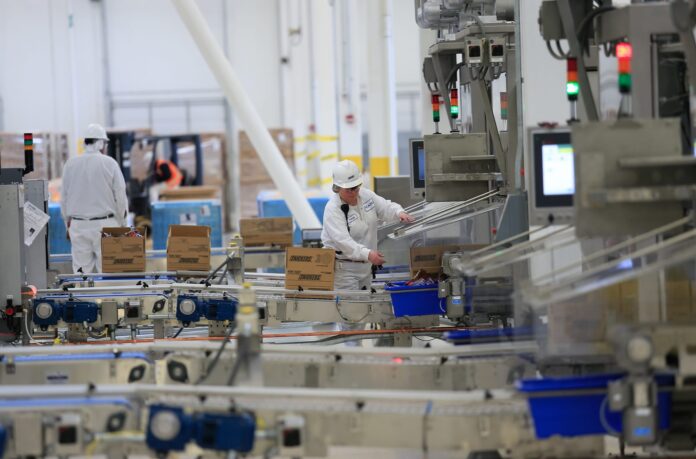US-based food manufacturing giant Mars has rolled out digital twin technology, marrying IoT sensor outputs with AI analytics inputs in a edge/cloud dashboard, across its factories in the US, specifically to reduce instances of over-filling packages in food production. The solution, designed with IT services consultancy Accenture, and in trial in an Illinois factory since 2020, is also being rolled out to its pet care operations in Europe and China.
A year ago, a year into their collaboration, Mars confirmed it had Microsoft and Accenture in tow to bring new IoT and AI solutions to its manufacturing and supply-chain operations. The work was presented as part of an expanded deal with Microsoft around its Azure cloud and analytics services, geared to drive digital change at the company. The project extension with Accenture was to create digital twins of manufacturing processes using the Azure IoT platform.
The objective, now proven, according to the parties involved, was to support process control and consistency across product lines, to increase speed and capacity, and to reduce operational costs. From the start, the objective has also been to cascade the Illinois setup, plus “similar IoT technologies”, across its manufacturing segments, and into all of its global plants. Its latest missive from the Industry 4.0 front line describes the Illinois site as a ‘factory of the future’.
Or a developing model for one, at least. Over-filling packages, the first use case for its digital twin control engine, is described as a “common problem in the food industry”. The agreement with Accenture will see the same digital simulation machine learning (ML) models applied to the company’s manufacturing facilities globally, said Accenture. “Mars plans to apply them to dozens of use cases over the next three years,” it said.
Meanwhile, “over the next two years”, the pair will create a new cloud platform to process sundry data from its manufacturing applications, including from existing machines and new robots, to “lay the foundation for its vision of the ‘factory of the future’. The platform will reside “at the edge”, said Accenture, implying the on-site factory ‘edge’. The plan is to also address “water stewardship, reducing waste, and… greenhouse gas emissions”.
There is no mention, anywhere, of private LTE or 5G as the connectivity fabric in the Accenture-designed edge setup at Mars. A press statement implied Accenture is the key partner in the project, and Mars’ way into the Microsoft ecosystem. Accenture is Microsoft’s ‘manufacturing and supply chain partner of the year’. “It works closely with Microsoft to leverage the Azure platform and Accenture’s proprietary edge accelerators,” said the statement.
It explained the Illinois use case: “Fed with real-time data, [digital twins] can predict and optimize production processes and equipment performance, from reliability to quality to energy efficiency…[They] will enable Mars to simulate and validate the results of product and factory adjustments before allocating time and resources in the physical space.” The digital twin gave Mars a bird’s-eye view of the production lines at one of its factories in Illinois.”
The statement continued: “The twin fed sensor data from manufacturing machinery into a predictive analytics model, which allowed factory line operators to monitor events in real-time and adjust the filling process. After the successful test, Accenture and Mars introduced the solution across the U.S. and developed similar solutions for its pet care business in Europe and China.”
William Beery, vice president and global chief information officer at Mars Wrigley, said: “Our collaboration… enables us to scale digital twin technology to reach this goal, delivering not just significant cost savings and sustainability, but preparing our manufacturing operations for the future of work.” Thiago Veiga, senior director of digital supply and procurement at Mars, said: “Digital manufacturing is a key priority.”
Larry Thomas, a senior managing director at Accenture, said: “Our work with Mars is about using the power of data, cloud and edge computing to modernize factories, boost business agility in response to change, and put power in the hands of Mars associates so they can make informed decisions faster.”
Simon Osborne, leading the Mars project for Accenture, said: “The problems we are solving aren’t new; what’s new is how we use advanced technologies to get real-time data into operators’ hands and apply AI to help them make decisions before problems occur. While many companies are beginning to experiment with digital twins, what sets this project apart is the speed and scaling of the technology across Mars’ operations globally.”

